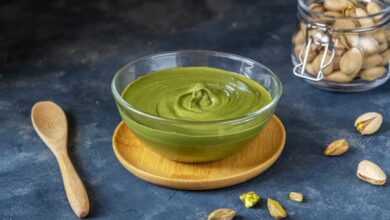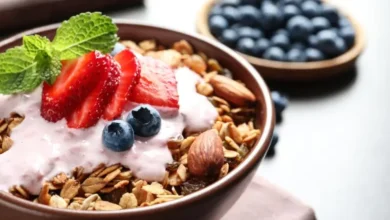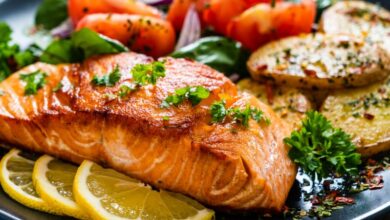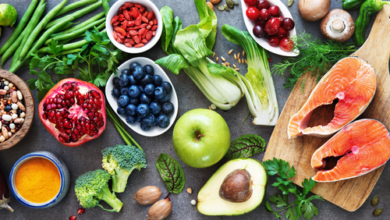7 Proteins to Add to Your Grocery List to Help You Lower Blood Sugar, According to a Dietitian

Keeping your blood sugar stable isn’t just a goal for people living with diabetes; we can all benefit from aiming for this. Some foods can cause your blood sugar level to spike. And when blood sugar levels get too high, they tend to crash afterward. That can leave you feeling tired and a little hangry.
When you eat foods high in sugars and starches, like desserts or white bread, your body breaks them down into a type of sugar called glucose, which raises blood sugar. This signals the pancreas to release insulin, which helps move sugar into the body’s cells for energy. But if your diet consists of a lot of these sugar-spiking foods, your body’s cells can start to ignore insulin after a while. That’s called insulin resistance and it can be problematic, according to the National Library of Medicine.
Insulin resistance can lead to type 2 diabetes, but can also contribute to polycystic ovary syndrome (PCOS), obesity and metabolic syndrome (a combo of high blood pressure, large waist size and abnormal cholesterol levels). Insulin resistance is sneaky and can happen without causing any symptoms.
Eating foods with quality protein can help you keep your blood sugars balanced and avoid developing insulin resistance. Protein can also help you feel full, help you keep your lean body mass and provide you with stable energy. Per the National Library of Medicine, about 20% to 35% of your daily calories should come from protein, depending on several factors, like your age and how healthy your kidneys are.
7 Proteins to Add to Your Grocery List
To prevent blood sugar spikes, it can be helpful to focus on quality protein sources at your meals—particularly if you’re at risk of conditions linked to higher blood sugars, like type 2 diabetes. Reducing your carb intake and focusing on healthy proteins and fats can help you stay off the blood-sugar roller coaster. Here are seven protein-rich foods you can add to your shopping list to help with balanced blood sugar levels.
1. Eggs
Eggs are nature’s multivitamin. Not only are they full of protein—one large egg has around 6 grams—but they’re rich in other nutrients that your body needs too. They’re good sources of vitamins like B12, B6 and A, and essential minerals like choline, sodium and potassium. In addition, eggs have quality protein and very few carbohydrates, which means they won’t spike your blood sugar levels.
Eggs are a great addition to your breakfast if you’re concerned about insulin resistance. In a 2018 study published in Food and Function, participants who ate eggs each day had more stable blood glucose and lower levels of insulin resistance.
2. Salmon
If you’re a fan of seafood, salmon—or any other type of fatty fish—is a great way to make sure you have some quality protein on your plate. Salmon has zero carbohydrates and more than 22 grams of protein in a 3-ounce cooked fillet. Not only that, but it is a great source of nutrients our bodies need, like calcium, sodium, choline, retinol, vitamin B12 and selenium. The omega-3 fats that salmon contains have been shown to support a healthy brain and a healthy heart, as well. No wonder the American Diabetes Association lists salmon as a superstar food.
3. Sirloin Steak
A small 4-ounce piece of sirloin on your dinner plate will give you more than 22 grams of satisfying protein and a wealth of nutrition, per the USDA. Beef is packed with vitamin B12, calcium, potassium and heme iron, which our bodies absorb better than non-heme iron from plants. It’s also a great source of phosphorus, niacin, magnesium, folate … the list goes on.
Protein is broken down into amino acids in our bodies. A 2023 study published in Nutrients found that protein from animal sources, like steak, is absorbed and used differently in the body than protein from plant sources.
4. Cottage Cheese
Just a half-cup of whole-milk cottage cheese contains about 13 grams of protein and is an excellent source of many vitamins and minerals, such as calcium, vitamin A, phosphorus, beta carotene and more.
The American Diabetes Association lists cottage cheese as a great protein source for people with diabetes because it shouldn’t contribute to blood sugar spikes. Cottage cheese comes in different curd sizes and fat contents, and pairs well with many different types of fruits and veggies.
5. Peanut Butter
Whether you like it creamy or crunchy, peanut butter is always satisfying. Just a couple of tablespoons will provide you with nearly 8 grams of protein, plus fiber, magnesium, zinc, vitamin B3 and folate.
Some brands of peanut butter have added sugar, so pick a brand with simple ingredients: just peanuts and salt. And if you want to feel satisfied and have sustained energy, pair the peanut butter with low-carb veggies instead of a simple carb, like white bread. A snack of carrots and celery dipped in peanut butter never disappoints.
6. Chicken Drumsticks
Chicken breasts might feel a little bland and boring, so give chicken drumsticks a try instead. They’re made from flavorful dark meat, and just one cooked drumstick will give you a whopping 25 grams of protein. Chicken also contains all the essential amino acids—the ones our bodies need and can’t make on their own.
Chicken is a rich source of many different nutrients, particularly choline. According to the National Institutes of Health, choline is a nutrient that our bodies need; it helps us regulate mood, memory and muscles. It’s also necessary for brain health. While our livers make a little choline, most of it needs to come from the food we eat. Chicken has more than 70 milligrams of choline per drumstick.
7. Mixed Nuts
All types of nuts are packed with protein—even peanuts, which we call nuts but (fun fact) are really legumes. Whether you like pistachios, walnuts, pecans or any other type of nut, they can help you feel satiated and keep your blood sugar stable, according to research published in Nutrients. Just an ounce of mixed nuts will give you 5 grams of protein. They’re also full of fiber, folate, beta carotene and many other vitamins and minerals. If you’re sensitive to carbohydrates, stick to nuts with fewer carbs, like pecans, macadamias and walnuts, as opposed to nuts with more carbs, like cashews and pistachios.
Originally appeared: EatingWell.com, September 2023










